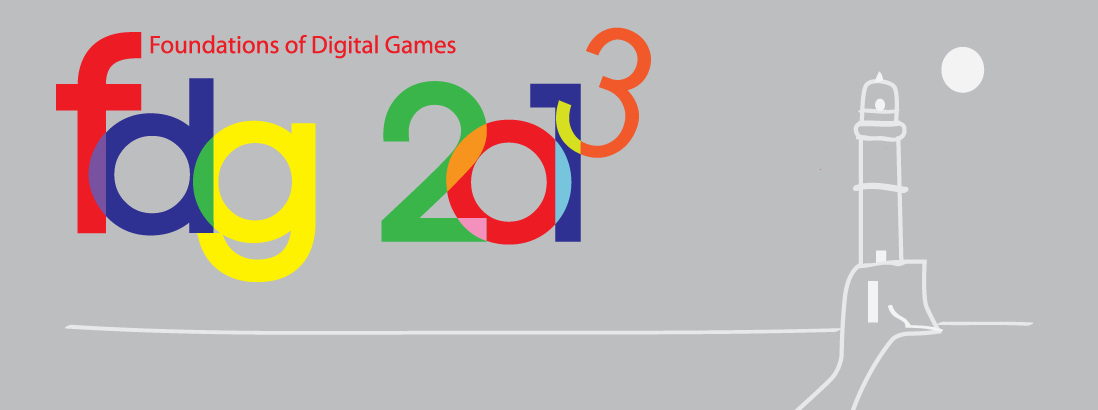
Workshop Proceedings of the 8th International Conference on the Foundations of Digital Games
Society for the Advancement of the Science of Digital Games, ISBN 78-0-9913982-1-8
Second Workshop on Design Patterns in Games
- Jose Zagal, Staffan Björk, and Kenneth Hullett
- Front matter
- Valter Alves and Licinio Roque
- Design patterns in games; The case for sound design
- Steve Dahlskog and Julian Togelius
- Patterns as objectives for level generation
- Joris Dormans
- Making design patterns work
- Kenneth Hullett
- Cause-effect relationships between design patterns and designer intent in FPS levels
- Christopher Dristig Stenström and Staffan Björk
- Understanding combat design in computer role-playing games
- Richard Wetzel
- A case for design patterns supporting the development of mobile mixed reality games
First International Workshop on EVE Online
- Marcus Carter, Darryl Woodford, and Kelly Bergstrom
- Internet spaceships are serious business: EVE Online workshop introduction
- Martin R. Gibbs, Marcus Carter, and Joji Mori
- Vile Rat: Spontaneous shrines in EVE Online
- Richard Page
- The Dao of space piracy: Tradition, modernity and ethics among online gamers in Shanghai
- Darryl Woodford
- Dispute resolution across platforms: Offshore gambling industry & EVE Online
Games for Learning Workshop
- Allan Fowler
- Measuring learning and fun in video games for young children: A proposed method
- Dana Ruggiero
- Video games in the classroom: The teacher point of view
- Wattanasoontorn V., Boada I., and Sbert M.
- LISSA: A serious game to learn cardiopulmonary resuscitation
- Panagiotis Zaharias and Ioanna Chatzeparaskevaidou
- Hedonic and pragmatic qualities as predictors for motivation to learn in serious educational games
- Iro Voulgari and Vassilis Komis
- Player characters as devices for supporting learning in massively multiplayer online games
- Simon Leander Mikkelsen, Anders Hartzen, and Rilla Khaled
- Escape from Trelleborg – Situated learning through augmented reality
- Yun-Gyung Cheon, Corrado Grappiolo, and Christoffer Holmgård
- Towards validating game scenarios for teaching conflict resolution
- Maria Saridaki, Constantinos Mourlas, and Elina Roinioti
- Engaging students with intellectual disabilities through location based games
- Giorgos Evgeneiadis, Vassiliki Kouloumenta, and Alexandros Potamianos
- Analyzing exploration and exploitation patterns in multimodal dialogue games for preschoolers
- Gillian Smith and Casper Harteveld
- Procedural content generation as an opportunity to foster collaborative mindful learning
The Inaugural Workshop on the Global Game Jam
- Allan Fowler, Mirjam P. Eladhari, Foaad Khosmood, and Ali Arya
- Front matter
- Allan Fowler, Foaad Khosmood, and Ali Arya
- The evolution and significance of the Global Game Jam
- Lars Reng, Henrik Schoenau-Fog, and Lise Busk Kofoed
- The motivational power of game communities - engaged through game jamming
- Michael James Scott and Gheorghita Ghinea
- Promoting game accessibility: Experiencing an induction on inclusive design practice at the Global Games Jam
- Alexander Zook and Mark O. Riedl
- Game conceptualization and development processes in the Global Game Jam
- Shinji R. Yamane
- Adaptability of the Global Game Jam: A case study in Japan
First International Workshop on Intelligent Digital Games for Empowerment and Inclusion
- Björn Schuller, Lucas Paletta, and Nicolas Sabouret
- Intelligent Digital Games for Empowerment and Inclusion – an introduction
- Ionut Damian, Tobias Baur, and Elisabeth André
- Investigating social cue-based interaction in digital learning games
- Dana Ruggiero
- The four keys of social impact games
- Björn Schuller, Erik Marchi, Simon Baron-Cohen, Helen O'Reilly, Peter Robinson, Ian Davies, Ofer Golan, Shimrit Friedenson, Shahar Tal, Shai Newman, Noga Meir, Roi Shillo, Antonio Camurri, and Stefano Piana
- ASC-Inclusion: Interactive emotion games for social inclusion of children with autism spectrum conditions
- Stefano Piana, Alessandra Staglianò, Antonio Camurri, and Francesca Odone
- A set of full-body movement features for emotion recognition to help children affected by autism spectrum condition
- Marios Christoulakis, Andreas Pitsiladis, Argiro Moraiti, Nektarios Moumoutzis, and Stavros Christodoulakis
- EShadow: A tool for digital storytelling based on traditional Greek shadow theatre
- Aikaterini Bourazeri and Jeremy Pitt
- Serious game design for inclusivity and empowerment in SmartGrids
- Ian Dunwell, Petros Lameras, Craig Stewart, Pangiotis Petridis, Sylvester Arnab, Maurice Hendrix, Sara de Freitas, Mark Gaved, Björn Schuller, and Lucas Paletta
- Developing a digital game to support cultural learning amongst immigrants
- Hazaël Jones and Nicolas Sabouret
- TARDIS - A simulation platform with an affective virtual recruiter for job interviews
- Nick Degens, Gert Jan Hofstede, Samuel Mascarenhas, André Silva, Ana Paiva, Felix Kistler, Elisabeth André, Aleksandra Swiderska, Eva Krumhuber, Arvid Kappas, Colette Hume, Lynne Hall, Ruth Aylett
- Traveller – Intercultural training with intelligent agents for young adults
Fourth Workshop on Procedural Content Generation in Games
- Joris Dormans and Stefan Leijnen
- Combinatorial and exploratory creativity in procedural content generation
- Ricardo Lopes, Ken Hilf, Luke Jayapalan, and Rafael Bidarra
- Mobile adaptive procedural content generation
- Pedro Brandão Silva, Pascal Müller, Rafael Bidarra, and António Coelho
- Node-based shape grammar representation and editing
- António Ferreira, António Coelho, and Rui Rodrigues
- Content generation for turn-based strategy games
- Marie Gustafsson Friberger, Julian Togelius, Andrew Borg Cardona, Michele Ermacora, Anders Mousten, Martin Møller Jensen, Virgil-Alexandu Tanase, and Ulrik Brøndsted
- Data games
- Kate Compton, Joseph C. Osborn, and Michael Mateas
- Generative methods
- Eric McDuffee and Alex Pantaleev
- Team Blockhead Wars: Generating FPS weapons in a multiplayer environment
- Michael Andereck, Alan Price, and Roger Crawfis
- Procedural terrain generation for medical rehabilitation
Second Workshop on Intelligent Cinematography and Editing
- Remi Ronfard, Vineet Gandhi, and Laurent Boiron
- The prose storyboard language
- Paolo Burelli
- Adapting virtual camera behaviour
- Daniel Levin
- Bridging the gap between rich and sparse accounts of vision: A cinematic lens for visual cognition







